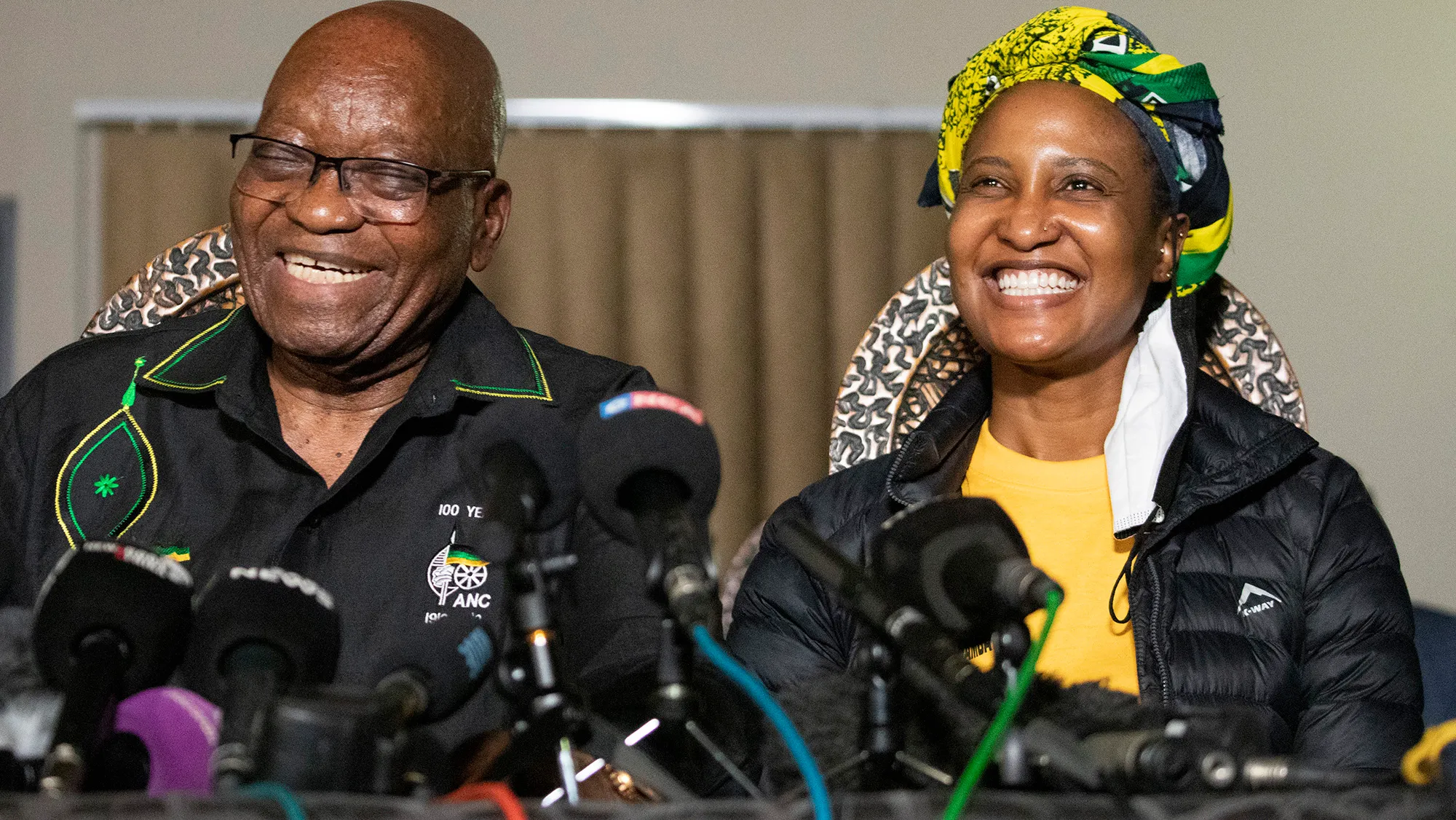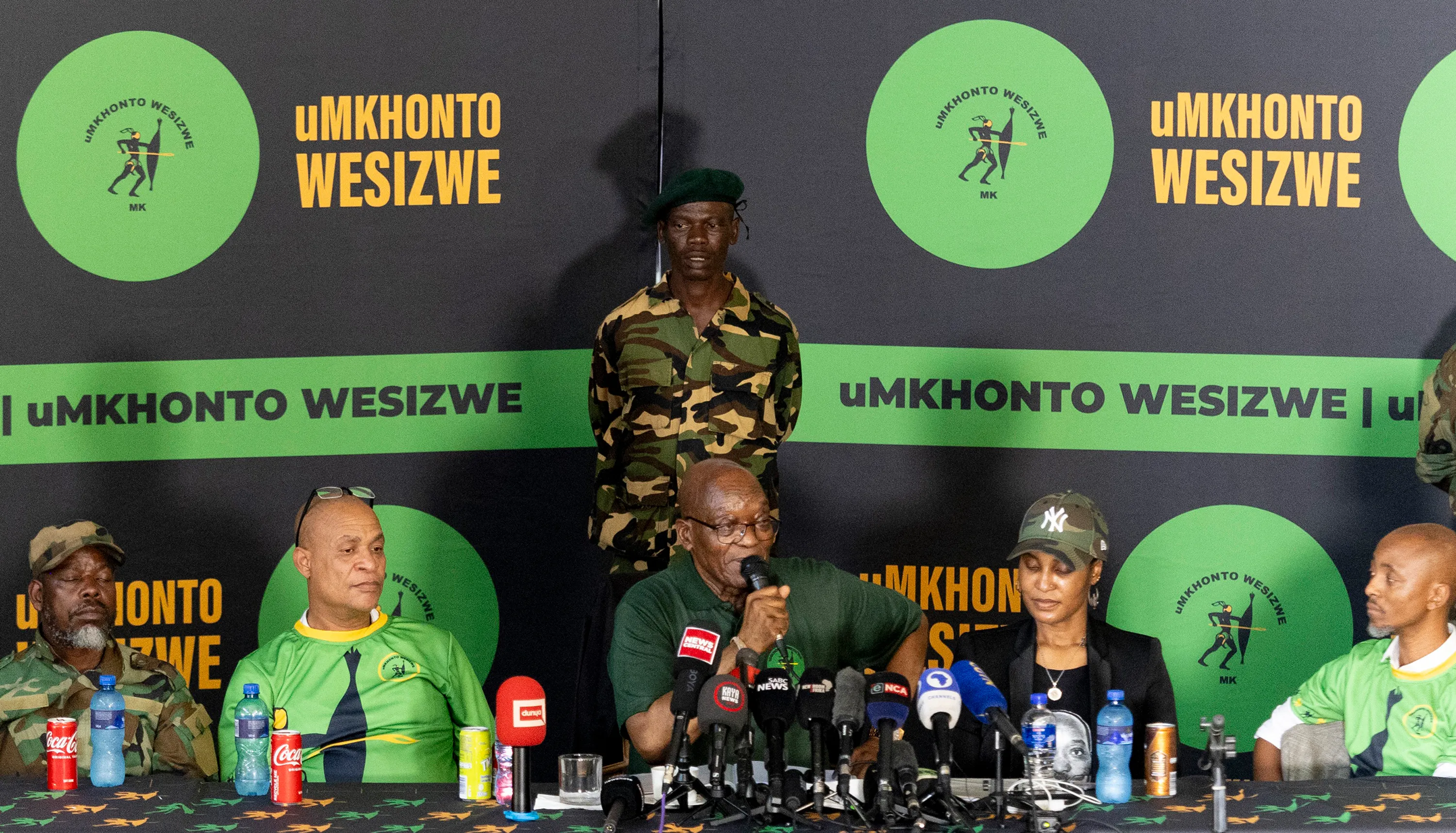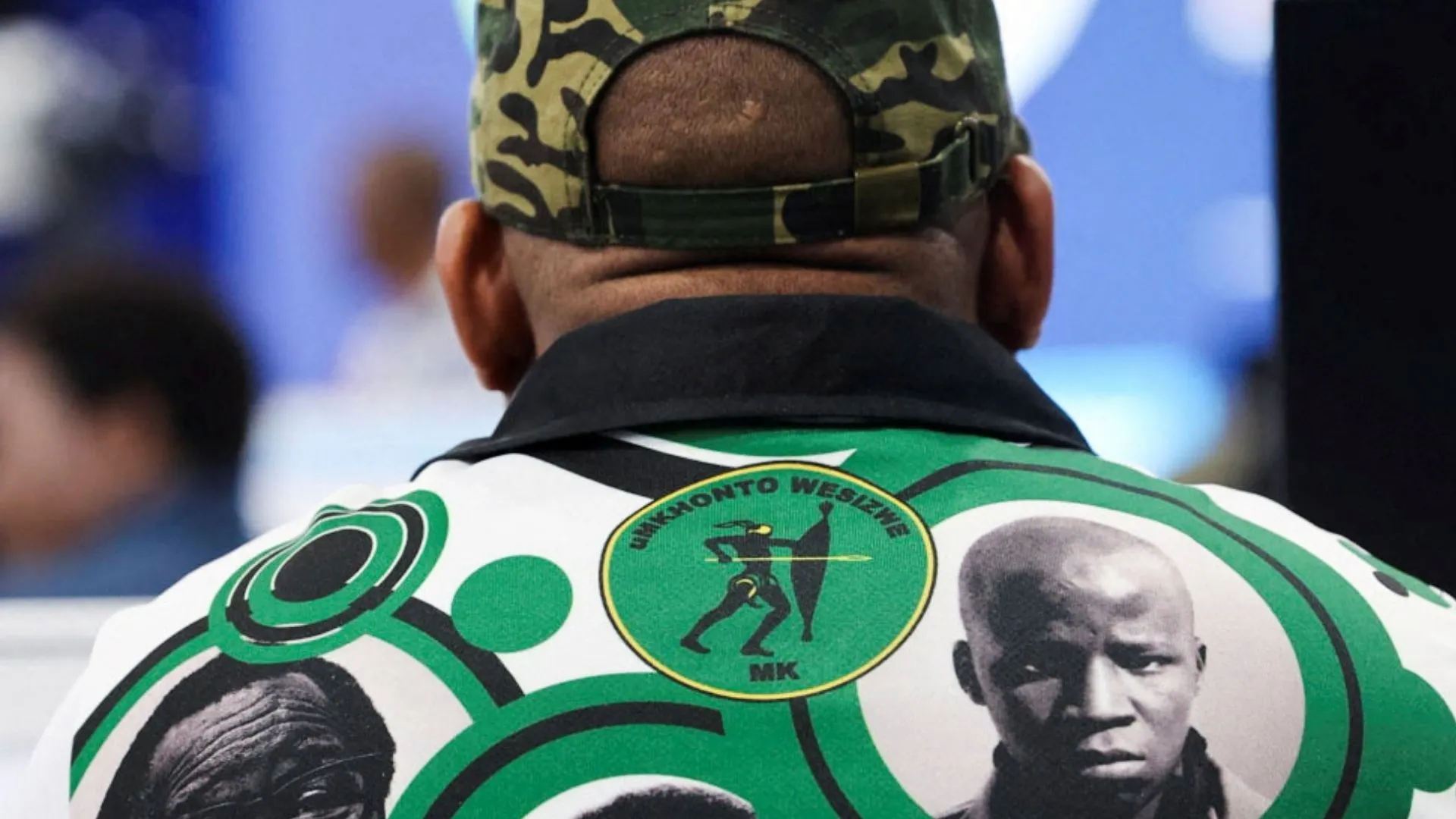To be fair to Zuma, he never really left. As pioneering president/jailbird, he has also launched the global zombie politics that now pertains across liberal democracies everywhere.
For those who have struggled to keep up with his bloodstained C-movie career arc, let’s recap. Zuma served as deputy president from 1999 until he was dismissed in 2005, during an internecine battle for the ANC’s soul. (It turned out that by the mid-zeroes, there was no soul left.) In his first return-from-the-dead party trick, he emerged to lead the party in 2007, becoming president of South Africa in 2009. A popular, if not entirely populist, figure whose base derives from KwaZulu-Natal, Zuma pitched left but swung right — nothing he and his party did during his many years of leadership approached a fair deal for South Africa’s struggling lower and middle classes.
Instead, Zuma repurposed state institutions to hose government funds into a mafia led in spirit by his family, and in fact by a small cabal of private and public associates who became very rich while the country grew very poor. A classic if clumsy kleptocrat, by the time he was defenestrated on Valentine’s Day, 2018, he was a whinging and resentful figure, facing literally hundreds of corruption charges and the prospect of a dotage spent in various far-flung courtrooms and jailrooms.
(If this sounds like someone orange and angry and American, stay tuned.)
President Cyril Ramaphosa and former president Jacob Zuma in Johannesburg, South Africa, on 18 December 2017. (Photo: Waldo Swiegers / Bloomberg via Getty Images)
Zuma’s replacement, the feckless billionaire Cyril Ramaphosa, proved incapable, possibly unwilling, to bring the ANC’s warring factions to heel. As Ramaphosa’s tenure advanced, South Africa’s economy, already in cardiac arrest to start with, was declared brain dead. At the core of the decline was the heavily indebted state-run energy company, Eskom, which was forced to schedule long periods of power cuts due to decades of looting. Ramaphosa campaigned against endemic corruption, but he proved uncommitted to ending it. (He mostly enjoyed playing Dad on TV.) And Zuma’s KZN base was never destined to accept any “clean-up” movement, however conceptual it may have been. In the event, Ramaphosa not only failed to do any tidying, but made things worse. Fatally, he left Zuma’s mafia out in the cold.
They were not pleased.
In July 2021, following the pandemic deprivations, and after a contempt of court case resulted in Zuma facing a 15-month prison sentence, KZN exploded. The violence was goosed by members of Zuma’s syndicate, most notable among them his daughter, demagogue-in-training Duduzile. Whether the term “insurrection” strictly applies in this case has been a matter of much think-tankery, but more than 300 people were left dead, and billions of rands of infrastructure and property were destroyed as riots spread further into the interior.

Jacob Zuma and his daughter Duduzile in Nkandla on 4 July 2021, just days before Zuma was taken into custody. (Photo: Leila Dougan)
As the ANC lurched toward a national election scheduled for May 2024, it resembled an overstuffed gourmand with a chronic case of constipation. What could its bloated, burping leaders — who threw T-shirts to the masses from their G-wagons — possibly campaign on? After countless scandals, after controversially remitting Zuma’s sentence, and after hundreds of thousands of dollars in cash were stolen from his couch (don’t ask), Ramaphosa increasingly looked like the man who would preside over the greatest electoral loss for the oldest and most celebrated liberation party in Africa. Worse, early in the campaign, Zuma refused to stump for the movement he had joined more than six decades ago, back when he was a teenage anti-apartheid activist. Adios, KZN base.

Jacob Zuma (centre) announces the formation of the new MK political party in Soweto on 16 December 2023. (Photo: EPA-EFE / KIM LUDBROOK)
And then, the bombshell. In December, Zuma emerged as the leader of a breakaway party called uMkhonto Wesizwe, or MK. The name is sacred to the ANC faithful, as it belongs to the party’s legendary, if long-defunct paramilitary wing. (MK also appropriated the ANC’s colours, its revolutionary term Mayibuye, and its chronic dysfunction.) Other than Zuma himself, MK was not comprised of veteran liberation warriors — indeed, it was difficult to tell who was a member, who ran it, who funded it, and what they wanted other than a bare-knuckle cage match.
Zuma, clearly the figurehead, declared that he was still an ANC member in good standing. The party disagreed and eventually expelled him. Then, the ANC hurriedly tried to copyright the MK name. They failed, a rare court case that the former president has won. Following this, there was a legal kerfuffle over whether Zuma — a convicted criminal, who not so long ago was on “medical leave” from his contempt of court sentence — was even eligible to be a member of Parliament. The answer, according to the Constitution, was a hard no.
Amid all the lawfare, and the inevitable internal squabbling within MK itself, the party eventually published a manifesto. What emerged from the turgid prose was an ethno-nationalist mélange of feudalism, socialism and hardcore paternalism — as 21st-century a phenomenon as iPhones or HD TV. It’s laughable to think that anyone would fall for this dreck, but resentment and rage are so prevalent in KZN that MK built momentum quickly. By the time polls closed late on the night of May 29, it appeared that for the first time in SA’s 30-year history of democracy, the ANC would lose its majority.
It was far worse than that. The party plunged by a stunning 17% in the polls, dropping to just over 40%, while MK earned almost 15%, lapping up most of the ANC’s shortfall. (While they won big in KZN, they also made inroads elsewhere in the country, and not exclusively with their ethnic Zulu base.) The outcome could hardly have been more catastrophic or humiliating, but what is now clear is that a start-up party comprised mostly of underworld figures and social media celebrities is the third-largest — and perhaps the most powerful — political entity in the country.

A member of the uMkhonto Wesizwe (MK) party keeps an eye on the results screen at the IEC’s National Results Operations Centre in Midrand on 30 May 2024. (Photo: Alet Pretorius / Reuters. This image has been cropped and edited by Daily Maverick from its original version as filed by Reuters)
In what has now become a boring trope of postmodern democracy, Zuma and his cabal declared the election rigged and demanded first a recount, and then a new vote. The 82-year-old Msholozi seems to have regained some of his former vigour — we can only wonder what moisturiser he uses. While he was once king, he is now kingmaker: as South Africa enters its national coalition era, it’s currently anyone’s guess who will form the core of the seventh national government. Will MK demand full governance of KZN in exchange for compliance at a national level? Will they demand Cabinet positions, leadership roles in state-run institutions? The presidency?
* * *
It’s too early to tell how all of this will unfold. But what is now certain is that both politically and physically, Zuma is unkillable. (I’ve lost count of how many times he’s claimed to have been poisoned — on one occasion by one of his wives.) With close ties to Russian shysters, KZN construction mobs, taxi bosses and local gangland assassins, Zuma and his party can do a lot of damage, if they don’t destroy themselves first.
How did this come to be? How could millions of South Africans vote for a party led by this ding-dong? Turns out, there’s a formula. Zuma has always portrayed himself as a victim of the system. But how many victims get to be president for nine years? Give Zuma this: he was never a member of the black bourgeoisie that aligned in the 90s with apartheid capital. As a ranking member of the rent-seeking elite, he was compelled to search for other options. Cut out of the mainstream “formal” economy, Zuma and his allies had to create their own niche. This should not be confused with progressivism or, as South Africa’s idiot conservatives describe it, “communism”. It’s a shadow patronage system, one that slowly gave itself a name: Radical Economic Transformation (RET).
Sadly, RET works in opposition to the law of the land. As its mascot and its sculptor, Zuma thus became the focus of the ire directed against RET’s vastly destabilising project. Which is why we now encounter another sad trope of the 21st century: the president as Everyman Schlub. As Loser-in-Chief. As His Excellency Homer Simpson.
But while Zuma was at odds with the formal system, he was also resolutely a part of it — he and his party were routinely endorsed by Goldman Sachs and other fancy international firms. And so the question is not What’s wrong with these damn fascists? (The fascists, after all, are doing just fine these days.) The question becomes What’s gone wrong with liberal democracy? Because South Africa under Zuma was not fascist. Then, like now, it had an independent press; robust opposition parties under no threat of censure (or violent repression) from the state; an independent Reserve Bank; a stock exchange free from political interference; open borders; and, for the most part, an independent judiciary.
Zuma was curtailed during his presidency from the full expression of his authoritarianism, chauvinism, feudalism and revanchism. Instead, he stole. Copiously. Not only did he steal, he instituted a state-wide mechanism for large-scale theft — the whole point of his government was to steal. He and his mafia cast the theft as a political and racial-redress project, as a means of redistributing the unethical spoils reaped by White Monopoly Capital. (The money was mostly redistributed to Dubai, but that’s a technical detail that should not be overthunk.) And inevitably, his stealing encouraged others to do the same. McKinsey, KPMG, EOH, SAP — the list of blue chip acronyms is as long as MK members’ own combined rap sheet.
The mix of liberal governance and manic public-private corruption resulted in the following: According to a recent biannual review from the SA Reserve Bank, “Since 2009, South Africa’s economic growth has lagged behind that of the world, emerging market and developing economies, and sub-Saharan Africa. South Africa remains one of the most unequal countries in the world as measured by wealth and income distribution.”
What happened in 2009? [Checks notes.] Oh, right! Zuma became president!
But it gets worse.
“In 2022, the wealthiest 10 percent of South Africans owned more than 85 percent of household wealth, 5 percent lower than in 2010. However, income inequality deteriorated over the same period, with the top 10 percent of households earning more than 65 percent of total income in 2022, up from 61.4 percent in 2010.”
Just to clarify: unless you’re a food bank or a homeless shelter, those numbers are not good. The data support the claim that Zuma’s presidency resulted in “nine wasted years” — that under his guidance, we ripped a hole in space/time and hurtled backwards into a future of failure. What’s now evident is that, in forced collusion with the “formal economy”, Zuma and his mafia actually created the conditions for his return from the dead as a populist. It’s the single greatest political trick in the history of this country, and perhaps any other:
Fuck the place up, then whinge endlessly about it, then re-emerge as its only possible saviour.
* * *
This chutzpah is currently on full, weaponised display. MK’s members campaigned against the Constitution, won big, and are now approaching the Constitutional Court to delay the first sitting of the National Assembly that they have insisted on boycotting. They invent ways to be victims and then use that victimhood as superfuel to generate their next act of martyrdom — while being the biggest bullies of them all.
Again, this circular logic — this hijacking of victimhood from the genuinely oppressed — is hardly a South African phenomenon. Nigel Farage, the toothy far-right British Brexiteer, has returned from Podcastlandia to “save” the UK from … the austere and chimerical benefits of Brexit. Trump, raised by scumbag hyper-capitalists to become a scumbag hyper-capitalist, campaigns on … saving the US from the austere and chimerical benefits of scumbag hyper-capitalism.
It’s the same principle as an ambulance driver backing over a pedestrian, and then charging for the subsequent paramedic services.
Zuma hardly stands alone in the pantheon of modern zombie politicians for having presided over the economic decline that allows him to mine popular resentment for political gain. But we shouldn’t pretend that it was his fault alone. South Africa under the ANC — or, rather, South Africa under liberal democracy — has not produced a society in which the bottom 90% can flourish. The cream is skimmed by the top 10% before the majority have the chance to taste it. This pattern repeats itself over and over again, across the world, and it releases a tribal atavism, a politically fungible fury.
As the writer Pankaj Mishra noted, “An existential resentment of other people’s being, caused by an intense mix of envy and sense of humiliation and powerlessness, ressentiment, as it lingers and deepens, poisons civil society and undermines political liberty, and is presently making for a global turn to authoritarianism and toxic forms of chauvinism.”
Zuma, we must by now realise, is not the cause of our troubles. He is a symptom, a final result of decades of troublesome mistakes. Of a country and a society that made faulty assumptions about what works economically. Of a high priesthood of experts that refuses to discuss proper redress for the sins of the past. Of a place that cuts off tens of millions of people from what they believe is their due, and then shames them for it. Of a system in which the rules of a parsimonious household are thought to apply to a vast and sprawling country full of starving people.
This should stand as a warning to those looking to cobble together a coalition government that only slightly tweaks the status quo: You can’t kill Zuma, but he can kill you. We live in a time of political cults, where the rule of law only further incentivises charismatic ghouls to crawl from their graves over and over and over again, intent on chowing flesh. The stench of the crypt reminds us that something has gone badly wrong with liberal democracy.
Perhaps it’s time to fix it. DM

Source link : https://www.dailymaverick.co.za/article/2024-06-11-lifelong-victim-with-murderous-instinct-jacob-zuma-is-an-unkillable-zombie-stalking-south-africa/
Author :
Publish date : 2024-06-11 20:19:41
Copyright for syndicated content belongs to the linked Source.






